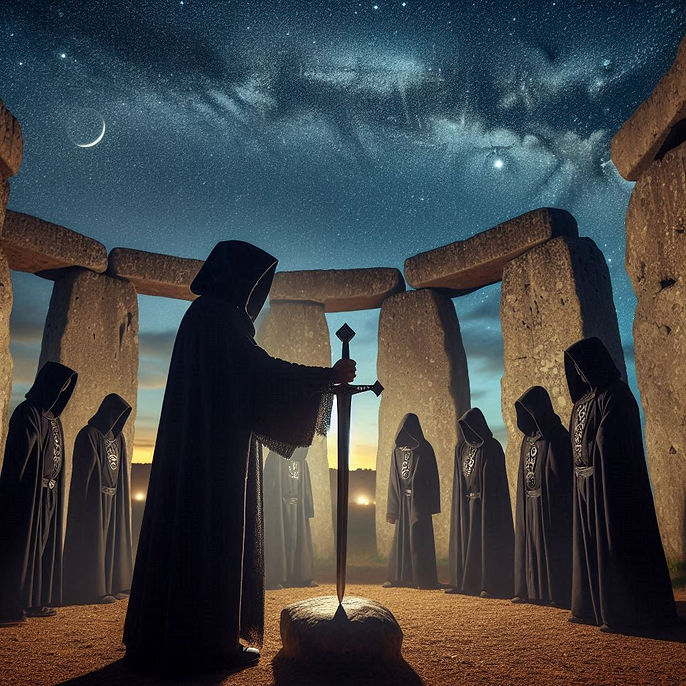

The meaning of Christo is : Follower of Christ; the Anointed One, Follower of Christ, the anointed and its origin is Greek, derived from χρίω (chrio) meaning "to anoint".
So ‘Follower of Christ' is the reason for Christo.
The term “Druidry” was a creation of Ross Nichols, in the mid-twentieth century. He wanted to stress that the Druid path was not an “ism,” an ideology or set of beliefs.
Strip Druid right back to the word, Dru as the Celtic word for oak and combine it with the indo-European root Wid (to know) and go with the translation of 'one with the knowledge of oak'
The core here is nature, working to achieve a connection with nature, learning from and respecting Nature.
Some say Druidry without spirituality and the Celtic influence wouldn’t be Druidry, yet still Druidry is practiced as a philosophy, some simply walk this path to help them create a better psychological connection with nature with new philosophical understandings that promotes better ecological ways of living, drawing inspiration simply from nature itself.
In short Druidry is practiced as a philosophy, or spiritual belief. Those who practice it as a religion you could say is more 'Druidism', rather than Druidry. Hence Ross Nichols coining the term Druidry.
All of those who choose one or more of these three paths are all Druids. Any and all of these three paths are entirely compatible with all religions, If the heart chooses.
Some say Druidry and Christianity are incompatible, pointing out how the imperial Church slaughtered all the ‘ancient druids’, failing to understand, modern Druidry, isn’t that which was wiped out eons ago.
In such, Christianity and the Christians of today exploring modern Druidry, aren’t the imperial Church which did the slaughtering in the past.
The irony and a very important fact to remember is, that the Neo-druidry that we see today was almost unanimously Christian, in its rebirth.
Julius Caesar, Commentaries on the Gallic War, VI 16 suggests the terrible slaughtering happened because of druids doing human sacrifices at that time, that on the altars and in the sacred groves dedicated to the Celtic deities, human blood was shed abundantly, and ritual torture and executions took place. These were deeds that the “civilized” Romans could not accept.
Ancient Druids and celts wrote nothing down, so what parts of Celtic Influence do we use (how little? how much?), what parts can be trusted, much of modern Druidry relies upon sources from literature from the early Christian period and also commentaries from classical Greek and Roman scholars, the only surviving records from the times ancient druids existed were written by classical authors who seem to have had no love for them.
The fact is that early neo-druidry was almost unanimously Christian in its rebirth.
Little was written at length for hundreds of years until William Camden, John Aubrey and John Toland took up the subject in the 1500s and 1600s. But it took later antiquarians, including William Stukeley writing in 1740, as well as William Borlase in 1754 and Richard Polwhele in 1797, developing the elaborate Druid theories and concepts, that we see today.
Both Stukeley and Williams were Christians. The native religion of the Neo-Druids was Christianity, until paganism took more of hold on it throughout the 20’th century into the 21’st. interfaith is entwined very much into the core of modern Druidry,
It’s a golden thread, as how can anyone claim to seek the wisdom of our ancestors, while ignoring the ancestors who created modern Druidry itself, simply because they were Christian?
Druidry today is a positive ‘modern version’ of what is, mostly a lost ancient path, that respects life and nature and in no way resembles a path that did human sacrifices in anyway, whether that account was biased, or not.
Neo-Druidry was almost unanimously Christian in its rebirth, created to help connect us into the cycles of life, to have a deep respect for nature again, deepening our connection to our God, the God of all creation.
Rituals are like a poetry within modern Neo- Druidry, seeking to connect people with nature in an alive and fun living way, bringing all types of different people together. The celebrations may be mostly oriented to a pagan feel, but the Eightfold Wheel of the Year seems to me more based on the Buddhist dharma wheel. Rather than only the historical pagan (Imbolc, Beltane, Lughnasadh and Samhain ) Garald Gardner who created the modern Eightfold Wheel, spent much time in Asia as a young man, and it shows a lot in modern druidism.
I personally think this is a good thing because technically it doesn’t matter where the Eightfold Wheel is inspired from (it’s observation of natural happenings in nature that our bodies have adapted too and our cultures from all over the world have been influenced by since the beginning, no faith owns that, it’s simply scientific.)
For more on how I as a Christian integrated the celebrations of the Eightfold Wheel with my Christian faith, here is the link https://www.christiandruidry.com/a-christian-journey-into-the-eightfold-wheel
There are endless courses and books to explore from, people will try and push what they feel Druidry is upon you, but stand firm, Druidry has no fixed theology or dogma, it’s not just for pagans as some will try and suggest or neither is Christian Druidry anti Paganism, leading to the term ChristoPagan that many who follow Christian Druidry also choose to call themselves.
But in the same point, if you wish to keep what you feel is the integrity of your Christian faith, while integrating the philosophies of modern Druidry that allow for a better connection to the cycle and rhythms of nature in your love for creation, in the power of Christ and in his name, you can do that too!